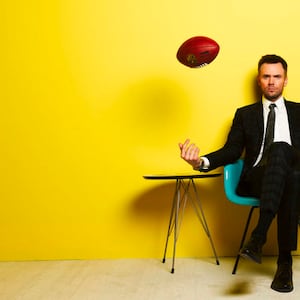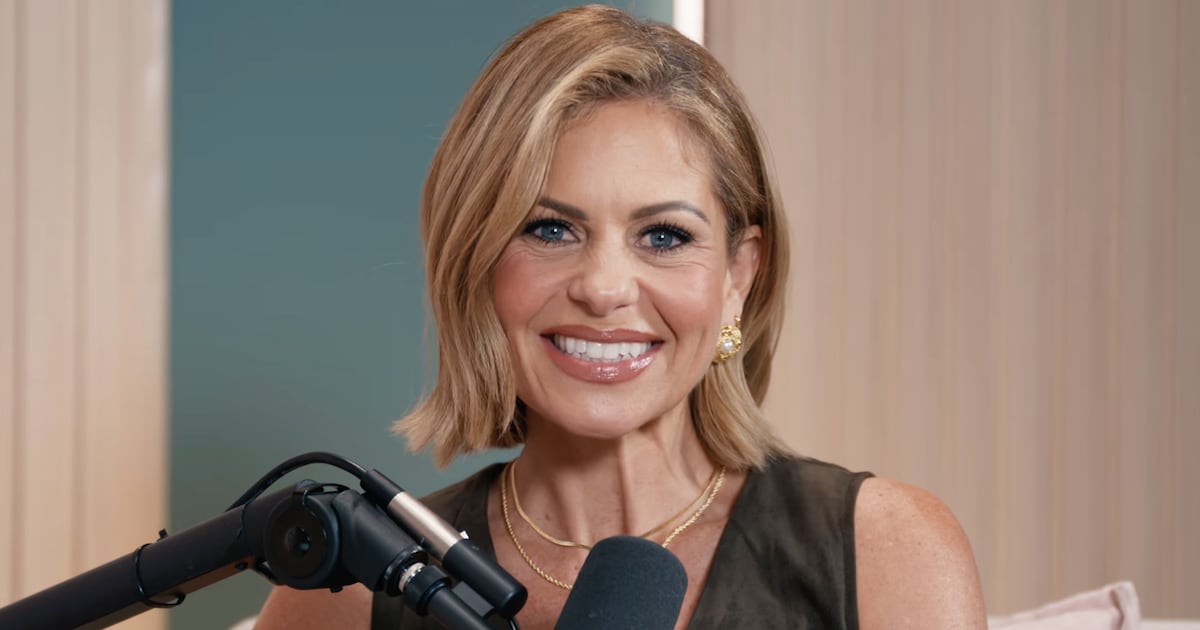Looking back at the year in pop culture, few TV moments were as thrilling and shocking as Tiffany “New York” Pollard’s scathing monologue delivered to Omarosa Manigault Newman on an episode of E!’s House of Villains.
The series, whose finale airs Thursday night, united the most notorious (and, by virtue, most entertaining) reality TV personalities from the last two decades, forcing them to live in a house together as they scheme, backstab, and compete for a $200,000 prize. Among the cast are Survivor’s Jonny Fairplay, The Challenge’s Johnny “Bananas” Devenanzio, Vanderpump Rules’ Jax Taylor, and, of course, Pollard and Newman—the former of Flavor of Love, I Love New York, and countless memes fame; the latter known from turning her time on The Apprentice into a stint at the Trump White House.
The scene that sent viewers’ jaws through the floor and cemented Pollard’s status as a peerless reality-TV legend came early in the season, when Pollard faced elimination. Furious at the likelihood of being sent home, she unloaded on Newman, calling her, among other things, a “cock-sucking, cum-guzzling Republican cunt,” and saying, “I sleep better knowing that you’re not in the White House.”
Asked what was going through his mind as he watched the moment unfold on set, House of Villains host Joel McHale tells The Daily Beast’s Obsessed that he instinctively whispered into his mic to producers, “Television gold.”
McHale knows what he’s talking about. The actor and comedian (Community, Animal Control) spent 11 years (lovingly) making fun of reality TV shows on E!’s The Soup, offering sarcastic commentary on the genre’s most mundane and most explosive moments. He’s accrued an encyclopedic knowledge about these larger-than-life personalities and what makes them such great TV, making him a perfect fit to host House of Villains.
Ahead of the season finale, we hopped on the phone with McHale to relive that instantly iconic Tiffany-Omarosa moment vicariously through him. We also talked about his approach to hosting a competition series like this without any “faux drama,” and why he thinks assembling this cast is akin to capturing a lightning storm in a bottle.
What was your initial reaction to the idea of this show, pitting all these reality TV villains against each other?
I thought it was a really clever idea. Beginning way-back-when with The Real World, [producers] learned that if you put one crazy person on a cast that they usually get all the [attention]. Then shows eventually evolved, and they just put all crazy people on.
With this one, they got all the really good game players together. Yes, they’re the villains of their shows, but they’re all very skilled. I’ve hosted, obviously, a competition baking show, but this is closer to the stuff that I used to make fun of on The Soup. I thought if they let me kind of turn it on its head and make jokes about the cast as it’s happening, and they can throw it back, then I will be very happy.
You’re obviously well versed in this genre because of hosting The Soup, but were you into reality TV before talking about it became part of your professional life?
I was. I watched The Real World going way back. Then—you probably were barely alive—but in the summer of 2000, I watched every episode of Survivor. That was the brand-new thing. It was mid-August in what was supposed to be the dead zone for getting ratings, and I was stuck to my TV like a child when Rudolph the Red-Nosed Reindeer came on at Christmas. And the same thing happened with American Idol. American Idol is really just a trumped-up talent show. It’s different from something like Survivor or Big Brother. We used to make fun of Big Brother constantly, but it was always getting the biggest ratings. Everyone was always like, as you know, “Oh, television is so awful now.” I was like, “Television’s never been better!”

It was a Golden Age, as far as I’m concerned.
We always said on The Soup that we do not like what we do not like, and we love what we love. If a show is calling itself out and making fun of itself while still doing the thing and being entertaining and playing the game, it would be hard for us to make fun of it. And it’s when they take themselves too seriously, that’s usually when we went after them. All the faux drama always drove me out of my brain. Big Brother, we would always say, “On this week’s episode of whispering and conspiring…” Because they would just sit around whispering on their beds, and I’m like, “America loves this?” But I thought the games on House of Villains were absurd. I am a huge fan of absurdity.
What was your favorite game?
Trying to get the key out of the ice block was one of my favorite moments. I was like, “This is all so wonderfully ridiculous.” So I was like as long as you let me make fun of it and not have to try to say some [faux-serious] thing where I’m like, “When you were trying to get the key out of the ice block, you took your pants down and rubbed your butt on it for five minutes. How did that make you feel?” That stuff drives me out of my brain. But I got to be like, “So you took your pants off and rubbed your butt on a block of ice for 10 minutes. You think your grandparents would be proud of you?” Stuff like that is my favorite.
In the premiere episode, you made a joke about Omarosa’s time in the Trump administration right off the bat. Everyone gasped and giggled, and she certainly didn’t seem pleased. Was joking about her connection to Trump something you debated doing, or was that always going to be automatic?
Automatic. Oh, yes, absolutely. I mean, she was in the Trump administration! So I was like, that’s pretty unique. Think about his trajectory of being a reality TV star and her trajectory of winning that show, and then cut to them in the White House. Like, you can’t make that shit up. She knows how famous she is, and she also knows how smart she is. You can tell with her gameplay. She’s really good. And if she couldn’t take that joke, then what are we doing? If you’re going into a show like this, you have to have a sense of humor. I also liked it when they gave me shit back, like when Bobby thought I was Carson Daly. Then Johnny Bananas was like, “Hey, Carson!” the rest of the shoot.
That’s hilarious.
I fucking love that stuff. Because what are we all doing here? What are we doing on this planet? If we can go on TV and win some money and play games and kind of take a vacation from our brains for a little bit, great. Then people go, “American television is awful.” I was like, “No, it’s great.” Some of it's awful, and we just get the good stuff from other countries. If you’ve seen a Japanese game show, we couldn't even put it on TV because it would be illegal.
So the long answer back to your question is Omarosa is savvy as shit. She had to know that we were gonna say shit. Tiffany Pollard’s screed on her as she was being voted off, I think that should be shown in the Smithsonian.
I don’t know how anyone could say American television is bad when we have a clip of Tiffany Pollard calling Omarosa a “cum-guzzling Republican cunt.”
My only regret about Tiffany is that she got voted off so early [in Episode 4]. My idea if we get to Season 2 is to just bring the same cast back. Why not? They bring the same cast back for all scripted shows. Why not for unscripted?
That’s true.
The energy in the room when you get Bobby and Tanisha and New York and Omarosa, obviously Johnny Bananas, Shake... All of them are pros, right? They all know how to play these games. That is fucking gold. If we get to Season 2 and try to duplicate that cast? I’m just like, “Good luck, guys.” I'm sure they'll get good folks. But, hey, why not just do it again with all the same people.
Was there anybody on the show you were surprised by, because they were either actually more like what we see on screen—or maybe the opposite, not like their on-screen personas at all?
Tiffany was always mellow, until she wasn’t. She’s kind of soft-spoken when she’s being conversational, but then if you piss her off, it is wonderfully showtime. Tiffany is a truly unique human being and television gold. It was funny. The one time producers yelled at me, they were like, “Stop becoming friends with everybody.” I was like, they’re all pretty cool. No one’s a dick, really. When I defend them, people are like, “How dare you! They were awful to these people in their shows.” But everyone was pretty cool. For real. But I will say when those cameras turn on, the energy in the room when you get those folks all together is higher than... I don't know. It’s like a boxing match’s energy. They can just turn it on. This is why they’ve all stayed famous for so long. They’re unique people who can play the game.

What you said about Tiffany’s monologue belonging in the Smithsonian is so true. I could talk about it forever. What was going through your mind as it was happening?
I think I whispered into the mic “television gold” when that happened. When it was happening, I was like, “Oh my gosh, this is crazy.” Because there is no doubt that the competition is real. There was a real amount of money on the line. So it’s an interesting mix of, are they joking around? Are they just hyping it up for the camera? Or do they really care? It is all those things, where they were joking around, but they all are in the competition. They’re all in, because they all wanted to win. No one was like, “I don't really need this money,” or anything like that. They wanted to win. So when that moment happened, it was like Mount St. Helens going off.
I can’t even imagine.
The energy in the room was very high. We would have those eliminations like every couple of days, so it was high stakes with lots of comedy. But when that happened, I was like, “Well, I guess we got our trailer right there. That is good television right there.” And that is something we would have used on The Soup, and then I would have probably sent a number of bottles of wine to Tiffany thanking her for helping us make more money. Ironically, she and Omarosa are huge churchgoers. There is a duality and a dichotomy that is just fascinating. And, again, it’s good TV. It was a wild moment. On top of that, if you watch the game, they go for it. And they go for it like their lives are depending upon it. I really, really appreciated it, because there was no point that the producers were like, “Hey, bring up your energy, guys.” There was none of that. There was no need.







